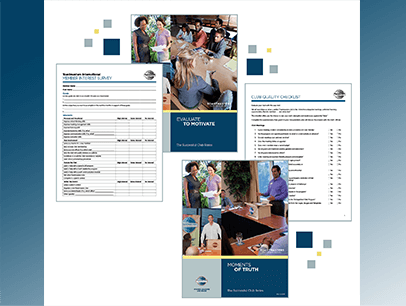There’s something about putting together a new team—you might feel a sense of anticipation, expectation, potential, and perhaps trepidation. Every January, Toastmasters clubs either mark the halfway point for their leadership team, or they elect new club leaders for six-month terms.
Whether you are a seasoned leader or a new one, now is a good time to examine your goals. What does your club need, what do you bring to the team, how do you want to grow your skills?
For all leaders, including Toastmasters club officers and members of a workplace or volunteer team, building and maintaining an effective team is crucial to accomplishing anything. Strong teamwork generates better and more efficient results and enhances the relationships on the team. Poor teamwork leads to mistrust, tension, and hurt feelings.

8 Factors of an Extraordinary Team
1 Clear Goals
The glue that holds any group together is the team mission. For Toastmasters, the club mission is to “provide a supportive and positive learning experience in which members are empowered to develop communication and leadership skills, resulting in greater self-confidence and personal growth.” Everything the club does should support this critical mission.
As soon as the team comes together, the first task should be to discuss the goals and priorities for the year. “[Have] the team go through the Club Success Plan. Use the questions as a springboard to quickly identify priorities they are most passionate about,” recommends Bob Hooey, DTM, Accredited Speaker (AS), and past Region Advisor, of Egremont, Alberta, Canada.
When everyone understands and agrees on the purpose and direction of the team, there is less chance of discussions going off topic or getting pulled in different directions.
2 Defined Roles
While some of the club officers may be returning to the team, others might be new. Each position has a defined set of tasks. Often, a person is elected to a role with responsibilities that allow the officer to lean into their strengths or develop a desired skill.
Sheryl Roush, DTM, AS, of Afton, New York, who has been a member for over 30 years and held numerous club officer positions, recommends that Toastmasters who are new to officer roles attend Club Officer Training to get a clear idea of what the role actually is (not what they think it is!).
Roush also advises that you ask each of your officers the one thing they want to accomplish during their tenure and how the team can help. Let them know they are not alone. Everyone is in this together.
3 Valued Diversity
On an extraordinary team, members ideally represent a range of backgrounds, experience, and opinions. Having a diversity of ideas, methods, experiences, and opinions is crucial to success. After all, if all the team members represent the same demographic group or have the same experience, their ideas will reflect a narrow perspective.
Whether you are creative or logical, fast or methodical, recognize each other’s individual talents and tap into their expertise—both job-related and other skills they bring to the team. Dr. Gayatri Deshmukh, DTM, a meditation practitioner and member of two Toastmasters clubs in India, says teams should leverage their diverse backgrounds and skills when assigning roles and tasks—something they can only do when they understand and know one another.
“Celebrate new ideas and give it a try! Don’t be afraid of failure as we can always do it better next time,” he says.
4 Open and Clear Communication
Effective teams communicate honestly, openly, and transparently, which is easier said than done. (See the sidebar on page 17 to help make it easier.) On a strong team, members feel comfortable sharing their thoughts and ideas, especially when they differ from the majority’s. Everyone listens with curiosity in order to understand one another. There is no fear of reprisal, shame, or embarrassment for sharing opinions.
5 Constructively Managed Conflict
Conflict is normal and natural to the process when you have committed and passionate team members. Some people are quick to express their (often strong) opinions, while others may accommodate the more vocal team members or avoid the conflict altogether.
An extraordinary team manages inevitable conflicts by confronting the issues rather than confronting other team members. They see conflict as a healthy way of “hammering out the truth.”
Strong teamwork generates better and more efficient results and enhances the relationships on the team.
“It’s important to note that even the best of us are not free from our unconscious biases, so it’s especially critical to take an objective look at the conflict at hand,” Sravanthi Vallampati, DTM, of Aurora, Ohio, a diversity, equity, and inclusion ambassador, says. “Separate the person from the problem, and model neutral language while honoring confidentiality in order to leave the persons in conflict, and the team, whole.”
A difference of opinion may open up possibilities, or problems, the team hadn’t thought of before. Rather than be annoyed by different viewpoints, members should pause and consider that angle. Even if the group decides not to act on that opinion, it’s important not to assign blame to the person who spoke up.

6 Effective Decision-Making
Extraordinary teams must make decisions all the time; it’s important to ensure the small decisions don’t take time away from the big ones.
“For our decisions to be worthy of our time and energy, also ask, ‘Why is this decision important?’” Vallampati suggests. “Value could manifest in many ways for individuals and teams: achieving goals, reducing cost, utilizing talent, resolving conflict, creating a sense of belonging, inventing new ways of learning and doing, empowering team members to lead, acquiring new skills, investing in something new, providing recognition, etc.”
Once it’s clear how the decision adds value, the team can select the best approach in executing it.
7 Balanced Participation
On an extraordinary team, people don’t just talk, they participate in a meaningful fashion, contributing when appropriate, regardless of their status in the group or years involved. Members of the team are equally committed. Although sometimes someone may be busier than others, overall there is a balance to the workload. If there is an imbalance, team members should feel comfortable asking for and offering help. One person does not dominate or hold the club hostage.
8 Positive Atmosphere
Strong teams establish a climate of trust and openness, because they know they need each other’s skills, knowledge, and expertise. Such a climate also means you hear plenty of laughter and the team members enjoy what they are doing. Team members trust each other implicitly, creating a safe environment for open communication and collaboration. There is a sense of belonging and a willingness to make things work for the good of the whole team.
Deshmukh, the Toastmaster in India, suggests teams of club officers spend time getting to know each other, finding out why they joined the club and why they want to be on the leadership team. Once teammates are comfortable with one another, they can be creative, take risks, and make mistakes.
Roush, the longtime Toastmaster in New York, who works with organizations to increase team morale and engagement, suggests having a creative, lively theme for every club meeting to infuse a sense of fun into the club dynamic. After all, your teammates are investing time with you and the club, so make your time together fun and energizing!
In this video, learn techniques for teamwork from 2019 Toastmasters International Convention speaker Lee Rubin, who provides five essential components known as the “5 C’s” to create a strong and confident leadership team.
Set the Stage
One very helpful tip is for a team to establish ground rules at the beginning. These are explicit expectations for how the team is going to behave. Some suggestions might be: “An agenda will be sent out 24 hours in advance of a meeting.” This allows members to prepare and be aware of what will be discussed. Another possibility: “Everyone must weigh in before any votes are taken.” This helps ensure that no one person may dominate the discussion.
To establish team ground rules:
- Have someone (among club officers, likely the Club President) define what the ground rules are and explain why they are important.
- Ask for input on what ground rules members have seen or used before that they feel would be helpful. Record the ideas.
- Check for agreement. After everyone has listed their ideas, ask if there are any rules that they cannot live with or support. Change as needed.
- Ask the team what the consequences should be if the ground rules are not followed.
- Post the ground rules in a prominent place at every meeting or include them in your board packet or on the agenda.
- Refer to the ground rules at the beginning of each team meeting. One of my volunteer teams started each meeting by going around the table with each person reciting one ground rule. At the end of the meeting, we shared our perspectives about what we did well and the two ground rules we could improve upon.
Encourage team collegiality.
Build camaraderie. Organize team-building events and casual gatherings, and start each meeting with a quick icebreaker or warm-up to get people talking and involved. Use icebreakers to reinforce the team’s values. For instance, take one of the Toastmasters International values—integrity, respect, service, and excellence—and use it as a springboard for discussion. Ask, “What does that value mean to you? And share an instance where you demonstrated or saw this value demonstrated.”Show progress.
Take time to review the team’s performance regularly. What’s working well, and what needs improvement? Continual feedback loops keep the team on track. Periodically evaluate and update team roles based on evolving skills and interests.On an extraordinary team, people don’t just talk, they participate in a meaningful fashion, contributing when appropriate.
For Toastmasters club officers, Rochelle Rice, DTM, AS, of New York City, recommends appointing someone to track your club’s success in the Distinguished Club Program. They can do this by visiting the dashboard on the Toastmasters website to review the Distinguished Performance Report. Share this with your club members quarterly and engage them to be part of the Distinguished Club goals.
Cheer each other on.
Celebrate achievements, no matter how small. When the team achieves a critical milestone or goal, give credit to each team member. Recognize that one person couldn’t have accomplished the task alone and that the team is greater than the sum of its parts. Compliment each member’s efforts, achievements, and good qualities. Recognize the simple things they do, such as being on time, completing assignments, and other tasks. A simple “thank you” goes a long way in boosting morale.Rice suggests asking each team member how they like to be acknowledged when something goes well. Give them a few ideas, because it’s possible no one has asked them this question, she notes. “Do they prefer a public acknowledgment? A quiet thank-you email? A handwritten note? At times, I may joke and ask, ‘Do you need a lottery ticket?’” In your heartfelt thank you, weave in specifics about what they did so they know how they contributed to the success of the team.
The foundation of extraordinary teams lies in their collective commitment to these eight factors. Team members should discuss these factors and intentionally create an extraordinary team dynamic that provides awesome value to all members.
Kristin Arnold is a professional meeting facilitator who challenges leaders and their teams to achieve extraordinary results—especially when the stakes are high. Find out more at extraordinaryteam.com.
Related Articles

Club Experience
Build a Great Leadership Team

Leadership
8 Ideas to Revitalize Your Team’s Morale

Club Experience
Surveys Speak Volumes

Communication



 Previous
Previous

 Tips for Team Communication
Tips for Team Communication
 Previous Article
Previous Article
